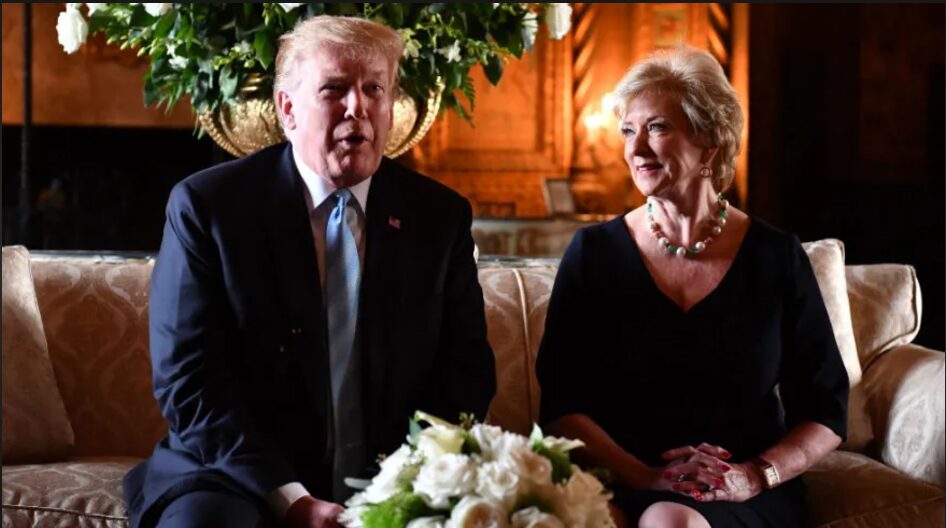The world has not only been surprised and stunned by the historical return of Trump to the White House but also keeping a close eye on Trump’s Cabinet picks. No other cabinet of any government has been discussed at this intensity in the past. Linda McMahon, the former CEO of World Wrestling Entertainment (WWE), which she co-founded with her husband Vince McMahon, has been nominated by Donald Trump as his nominee to lead the Department of Education, a department that the US President-elect has promised to abolish. In a statement on Tuesday, Trump referred to the wrestling magnate and wealthy Republican fundraiser as a “fierce advocate” for parents’ rights who is working hard to “give children an opportunity to receive excellent education regardless of zip code or income”. He went on to say that in her new role as Education Secretary, Linda McMahon will “fight tirelessly to expand ‘choice’ to every state in America”. It is essential to mention here that McMahon, unlike other members of Trump’s first administration, was not embroiled in scandal or controversy. She frequently endorsed his trade and tax initiatives.
Donald Trump’s relationship with professional wrestling is a lot more than an incidental connection to entertainment—it is a complex narrative of business, politics, and spectacle that reflects the broader dynamics of American popular culture. From the glitzy stages of Wrestle Mania to the corridors of political power, Trump has elegantly traversed between these two high-stakes worlds and utilized the theatrical strategies of wrestling to reshape political communication.
The roots of this relationship trace back to 1988 when Trump first became involved with Vince McMahon’s sports entertainment empire. Trump Plaza in Atlantic City sponsored WrestleMania, marking the beginning of a long-standing partnership that would transcend mere sponsorship. By 2007, Trump had moved beyond being a sponsor to becoming an active participant, participating in an elaborately scripted “Battle of the Billionaires” at WrestleMania, during which he dramatically shaved Vince McMahon’s head—a moment that represented both wrestling and Trump’s developing political personae as performative acts.
This relationship was not just mere entertainment, for it symbolized a greater symmetry of communication styles and engagement with the audience. The sport of wrestling, much like Trump’s presidential rallies, caters to dramatic narratives, over-the-top personalities, and the us-versus-them mentality. These theatrical controversies, mic drops, and emotional antics that unfolded in wrestling wrestling became templates used by Trump later in his political campaign.
Linda McMahon, Vince’s wife and a key figure in WWE’s corporate structure, became a crucial political ally for Trump. After two unsuccessful Senate runs, where Trump donated $5,000 to her campaign in 2012. She transformed her wrestling business acumen into political capital and concentrated on offering financial assistance to candidates. McMahon contributed $6 million to Trump’s campaign after he won the Republican presidential nomination in 2016. When Trump became the 45th president, he appointed her as the head of the Small Business Administration in 2017, recognizing her entrepreneurial skills. Her unwavering support culminated in her role as chair of the America First Policy Institute, a pro-Trump think tank that she formed in 2021 with Larry Kudlow and other advisers from the first Trump administration, and co-chair of his transition team after her resignation as the head of the Small Business Administration in 2019.
The influence of the wrestling industry on Trump’s political strategy cannot be overstated. The ability to craft compelling narratives, generate intense emotional responses, and maintain audience loyalty are skills honed in the wrestling ring that translate remarkably well to political rallies. Trump’s rhetoric often mimics wrestling’s dramatic confrontations—full of hyperbole, personal attacks, and theatrical showmanship. This symbiotic relationship extends beyond personal connections. The world of professional wrestling is a massive cultural and economic entity in the United States. Generating billions in revenue and enjoying the fervour of a passionate fan base, WWE stands for a uniquely American entertainment entity that combines elements of sport, theatre, and storytelling. Trump’s keen instinct to understand and use this platform really speaks volumes about his ability to connect with audiences outside of political boundaries.
Interestingly, however, Trump’s style more closely aligns with wrestling legends such as Ric Flair, who perfected the art of self-promotion, or Judy Rhodes, who understood how to work a narrative that resonated with the working-class mentality. Often, his political rhetoric sounded like wrestling promo material: bombastic, confrontational, and calculated to evoke emotion of the people. This wrestling-politics nexus becomes even more ingrained with the latest appointment of Linda McMahon as the Education Secretary of the US. Although her background in education may disappoint, but her selection speaks Trump’s continued reliance on loyal allies from the entertainment and business worlds who understand the power of narrative and spectacle.
In essence, Trump’s relationship with the wrestling business is more than a quirky footnote, but a strategic alliance that reveals profound insights into modern political communication. By using techniques that they learned from wrestling for theatrical showmanship in political discourse, Trump invented new ways of creating and communicating messages politically, turning political rallies into performances that captivated, entertained, and mobilized supporters. With its understanding of storytelling, audience engagement, and personal branding, the wrestling business lobby has found a perfect representative in Donald Trump—a political performer who turns every appearance into a must-watch event, blurring the lines between entertainment, business, and politics.
